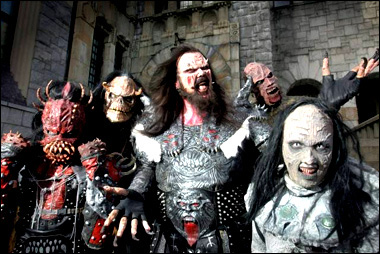
Every year there is a tournament in which countries from Albania to Turkey, from Russia to the United Kingdom, from France to the Ukraine battle for honours of the highest accord. The fight for the prize is seldom pretty. The playoffs last for many months, and supporters display a fanaticism that would test the mettle of fully armed Middle Ages Crusaders.
Countries compete fiecely to have the finals held on their turf, and it is no exaggeration to say that the machinations to secure the prize, including full televisual rights for the subsequent year’s event, would put even Ted Turner to the test.
Yes, I am of course talking about the Eurovision Song Contest.
Every Spring since 1956, countries from all across Europe (including, bizarrely, Israel and Turkey, countries that are by most other international reckoning in the Middle East) have competed in the arena of Song and Extreme Tackiness in order to take home the Eurovision title and the rights for next year’s telecast.
I’ve been a fan of Eurovision for many years since one memorable night at a friend’s house in which I was so overcome by emotion (or was it a fit of hysterical laughter?) that I could not stop the tears that streamed from my eyes. After picking myself up from the floor and pouring my fifteenth glass of Drambuie, the epiphany hit me, and I realised that Eurovision was not an embarrassing parade of badly dressed European pop tragics, but instead, a work of sheer comic genius.
OK. I’m reporting live from the telecast. Norway’s team takes the spotlight. The lead singer, an almost iconic cliché of a Norwegian blonde is supported by a dancing troupe of girls dressed in radioactive white. She warbles away at an instantly forgettable number. What is not forgettable is the dancing violin-wielding chicks who accompany her in the last chorus. Ah yes, once again I am reminded why I watch every year.
Malta is on. The singer is fairly belting it out, relentlessly hanging an exact semitone under the correct pitch. Tell me that someone does that in front of 300 million people by accident!
Germany’s entry Texas Lightning, flanked by illuminated saguerro cacti, delivers an insipid and quite confusingly American piece of country pop that has almost exactly nothing going for it. It even throws up the last resort of the desperate songwriter, a key change in the final verse. I am embarrassed to note that the lead singer (described, surely with irony, as an enchanting virtuoso) was born in Australia.
The Former Yugoslav Republic of Macedonia fronts up with a gorgeous woman with the most beautiful breasts who atonally tells us that “I wanna be with ya, I wanna give it to ya!” She is so energetic that I am very nearly convinced. She wants to give it to me! So what if she can’t hold a tune?
Lithuania scrapes to a new low with a lyric that says “We are the winners, we are the winners, of Eurovision, vote, vote, vote for the winners…” Guess what guys? Bzzzzzz.
Greece’s solo female performer has a lot of hair, and boy does she know how to use it.
The United Kingdom offers up some barely talented Cockney rapper supported by a half a dozen young women dressed as schoolgirls. Oh dear. Did I mention desperation a few sentences back? This bunch obviously remember the former Eurovision success of Russia’s pre-pubescent Tatu. I marvel that this time there is no lesbian tongue-kissing. (Yeah, see what you’ve been missing? Didn’t I tell you?)
Finland’s entry takes the stage. The… er… ‘hard’ rock band Lordi. Oh my oh my. What can I say? Remember the orcs in Lord of the Rings? Imagine them with guitars under a flashing disco lighting rig. Got that? I think the song is called ‘Hard Rock Hallelujah”. The lead singer is wearing demonic red contact lenses (unless that’s his real eyes) and… oh wait… he has an enormous pair of unfurling bat wings. Now there’s something you don’t see every day!
Oh my goodness. The Ukraine’s singer looks like Goldilocks all growed up. She keeps gesturing at her breasts. I have no idea what this means, because, unusually for the entries so far, she appears to be singing in her native tongue. She’s blowing kisses to the audience and her skirt is very short. Wow, if Ms Macedonia doesn’t deliver, I hope Ms Ukraine is up for a drink after the show.
France. Edith Piaf she ain’t. Don’t give up yer day job love.
The final entry swoops in from Armenia. Eeek! More hair action and some B&D Lite sets up an excruciatingly dull pop number that poses no threat to European political stability.
Oh, the thrills, the spills and the big hair!
But there has to be a winner and after the interminable Eurovision voting process, where many millions of viewers phone in their votes to be tallied live in what is a pretty formidable feat of technology, the numbers are stacking up. I had my money on Romania, but what’s this…? It appears that the ersatz Minions of Darkness, the prosthetically virtuosic Lordi seem to have romped in with the big prize.
It’s a shock result for Eurovision. The beautiful girls with the big hair, the short skirts and the amazing breasts have been left in the dust by a bunch of ugly trolls with bad teeth, bloodshot eyes and unintelligible lyrics (and they were singing in English).
More power to ya guys! That’s gonna look really impressive on a Heavy Metal resumé: Lordi: Satanic thrash metal rockers, worshippers of The Dark One, biters of the heads off chickens and winners of the 50th Eurovision Song Contest.
Talk about cred.
Pass me another Drambuie.








